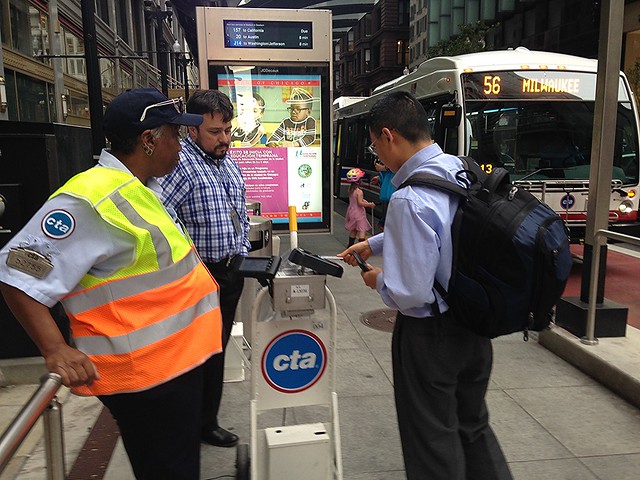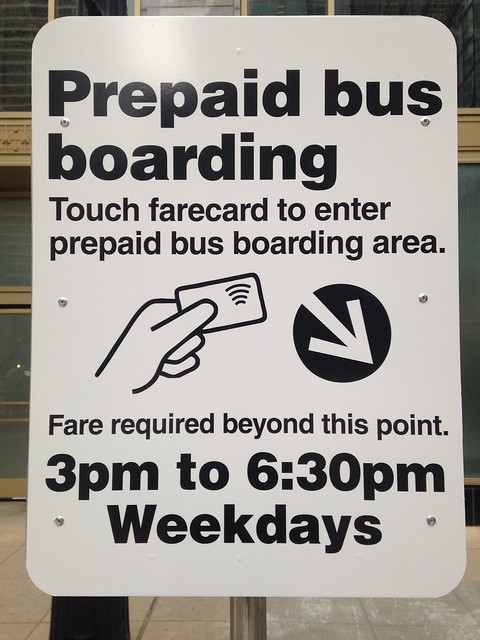
Besides being the day Chicago was ranked the top biking city by bicycling magazine, September 19, 2016, may also go down in history as the day the Loop Link bus rapid transit system started getting faster. While the corridor, which debuted last December, seems to have been resulting in modest timesaving gains for bus riders, it’s been missing a key element of robust BRT: prepaid boarding. Today the CTA launched a test of this feature at the Madison/Dearborn station, the busiest of the Loop Link stops, and it appears to be working well.
In June the CTA launched a six-month test of prepaid boarding for westbound #77 Belmont Avenue buses departing from the Belmont station of the Blue Line’s O’Hare branch during evening rush hours. Riders pay their fares at a portable Ventra card reader, staffed by a customer assistant, and waiting in a fenced-off bullpen until the westbound bus shows up.
The system at Madison/Dearborn was simpler to set up, since the raised station was already surrounded by railings, except for the side of the platform the bus pulls up to and the entrances to the ramps on the east and west sides of the facility. For the downtown prepaid boarding pilot, which will run for from 3:00-6:30 p.m. on weekdays, for a three-month period, CTA staffers are stationed at each side of the shelter with Ventra readers.
During the pilot hours, customers may only pay their fares with Ventra card or ticket, or personal credit or debit card, not cash. The CTA is encouraging customers at Madison/Dearborn who need to add transit value or unlimited ride passes to their Ventra account to do so at the Ventra machine inside the Walgreens directly behind the platform. Other options for adding value include ‘L’ stations and the Ventra app.
As you can see by comparing the two videos below (the first one was shot a few days after the December launch), prepaid boarding significantly shortens the bus “dwell” time at the station. With onboard fare payment, it took about 30 seconds for 11 passengers to get on the bus, but with today it took only about 15 seconds for ten customers to board – a roughly 50-percent timesavings.
The system didn’t work perfectly today. The CTA employees regularly had to call after customers who walked past them to tell them to swipe their cards. In one case, while a man was asking a customer assistant for transit directions, a woman unwittingly walked past her without paying, and the CA didn’t notice until a supervisor pointed it out.
Customers were not being directed to board through both doors of the bus, as is being done on Belmont. However, a CTA staffer said this may be done at Madison/Dearborn in the near future, if sufficient staff is available to direct some riders to the rear door of the bus.
And, presumably the transit agency doesn’t plan to have two staffers at each of the eight Loop Link stations in the long run, and prepaid boarding will be implemented 24/7, not just during the evening rush, so they’re going to have to figure out how to automate the system. But prepaid boarding seems to be off to a good start so far – hopefully it won’t be long until all of the BRT stops have this important feature.





